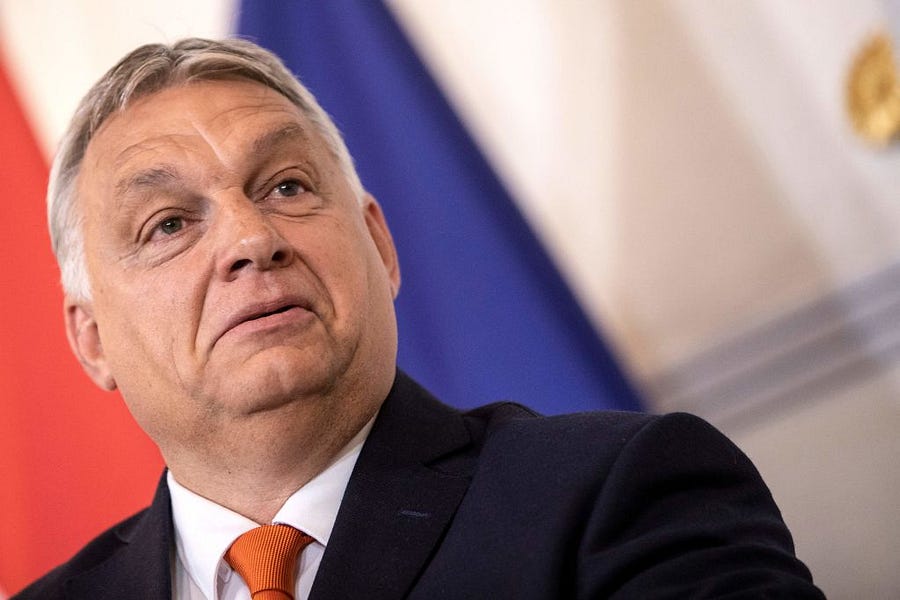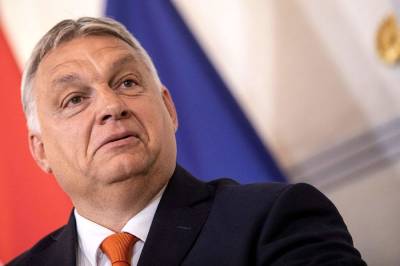In May of this year, the Conservative Political Action Conference (CPAC) came to Budapest, attracted by the persona of Hungary’s Prime Minister Viktor Orbán. “Have your own media,” he urged the attendees, to push against “the insanity of the progressive left.” This time around, it is Orbán who is coming to a CPAC held in Dallas, Texas. He can be sure of a raucous welcome.
But do U.S. conservatives know what they are signing up for in embracing Hungary’s strongman? On July 23, Orbán delivered a speech in Băile Tușnad, Romania, in which he echoed the infamous “great replacement” theory, railed against the “flooding” of Europe with migrants of non-European descent, and warned against becoming “peoples of mixed-race.”
The usual suspects are out trying to “contextualize” and downplay Orbán’s words. Obviously, they argued, he had not been talking about race—his concerns were purely cultural and therefore completely legitimate. Yet, that was not the impression that Zsuzsa Hegedüs, his long-time adviser and a conservative scholar of social mobility and inclusion, came away with. In her scathing resignation letter, she called the speech “worthy of Goebbels,” prompting Orbán to respond with a letter of his own, affirming his “zero-tolerance policy on both antisemitism and racism.”
While remarkable by the standards of the closed and disciplined one-party system that Orbán has built, the public clash is unlikely to have major political ramifications. His Fidesz party is too entrenched and too centralized around him to allow for any internal dissent or discussion. Not that CPAC participants would care, but the episode is illustrative of the distance that Orbán has moved since the time when a semi-plausible conservative case could be made for him as a leading voice of a new form of conservatism.
The audience in Dallas is also unlikely to be bothered by the fact that Orbán-led Hungary is the welfare queen of the European Union (EU), raking in more EU funds in per GDP terms than essentially any other member state. Will they care about Orbán transforming Hungary into a “pillar” (to use his words) of China’s Belt and Road Initiative? What about his obstinate rejection of the EU’s efforts to hold China accountable, such as in 2016 on the South China Sea, in 2017 on the torture of detained Chinese lawyers, and over the abuses in Hong Kong?
And how about Orbán’s policies on Ukraine? In the same Băile Tușnad speech, he labeled sanctions against Russia a failure and called for “a good peace proposal” instead of “winning the war.” For much of the conflict—until late July, actually—Hungary did not even allow the transit of Western military aid to Ukraine through its territory. At a time when other European countries are seriously revisiting their dependence on Russian energy, the Hungarian government sought to increase Russian deliveries of natural gas in the forthcoming months by sending its foreign minister, Péter Szijjártó, on a trip to Moscow.
The very same foreign minister received the Order of Friendship from Russian Foreign Minister Sergei Lavrov in December 2021, at a time when preparations for the invasion of Ukraine were already underway. It was at that time, moreover, that Russia and Belarus were orchestrating a refugee crisis on the border with Lithuania and Poland by flying in prospective asylum seekers from the Middle East and then urging them (oftentimes with threats of violence) to cross into the EU illegally.
Just a few weeks before Szijjártó received his award, Hungary’s foreign ministry had been hacked by Russian intelligence services, the FSB and GRU, which gained for an extended period of time complete access to all of the ministry’s systems and databases—including to the workings of secure, SCIF-like facilities at Hungarian embassies worldwide. There was not a peep of protest from the Hungarian side. Instead, the government tried to cover up and downplay the situation, which was placing not only Hungary’s national security at risk but also that of Hungary’s partners and allies in the EU and NATO—including the United States.
A lot has been written about the intellectual trajectory that America’s conservative movement finds itself on. It is difficult to think of anything that illustrates its current state better than a significant fraction of self-styled conservatives’ and influential Republicans’ embrace of a regime that is increasingly defined by paranoia and racism, and which demonstrably could not care less about America’s national interest. A movement that is increasingly defined not by any tangible political principles but by hatred of the other side (no matter how depraved or flawed it might be) will eventually fail. Our only hope is that America and its standing in the world not be damaged too much in the process.
Dalibor Rohac is a senior fellow at the American Enterprise Institute. Twitter: @DaliborRohac.





Please note that we at The Dispatch hold ourselves, our work, and our commenters to a higher standard than other places on the internet. We welcome comments that foster genuine debate or discussion—including comments critical of us or our work—but responses that include ad hominem attacks on fellow Dispatch members or are intended to stoke fear and anger may be moderated.
With your membership, you only have the ability to comment on The Morning Dispatch articles. Consider upgrading to join the conversation everywhere.